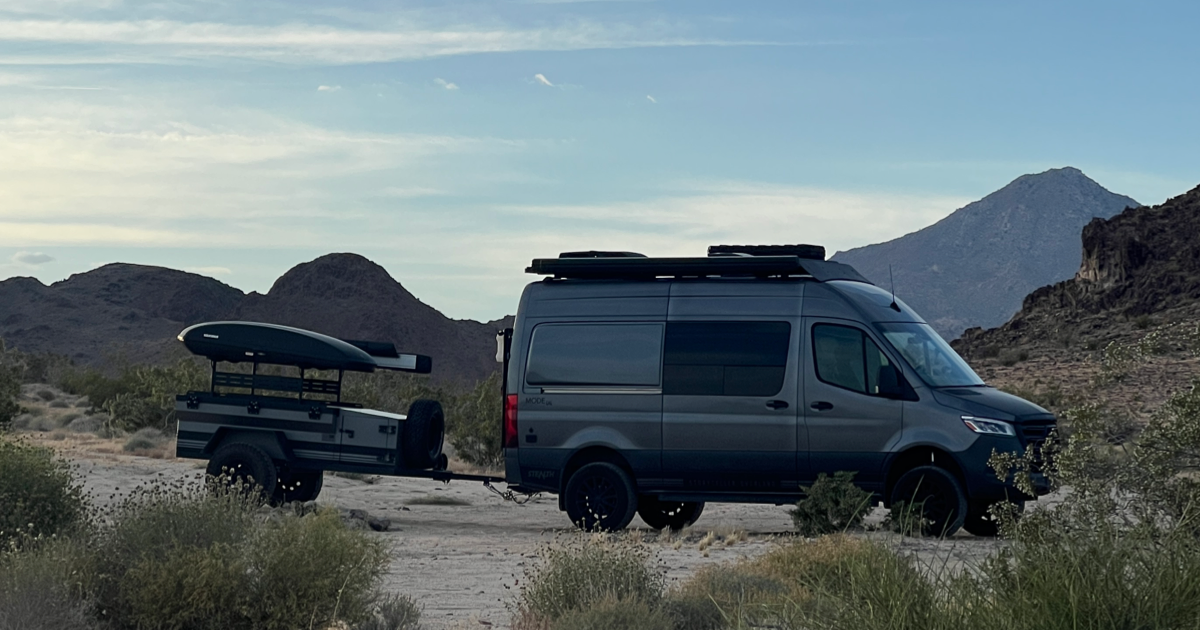Your Cart is Empty
free shipping over $60 - we ship in 1-2 biz days
free shipping over $60 - we ship in 1-2 biz days
Add description, images, menus and links to your mega menu
A column with no settings can be used as a spacer
Link to your collections, sales and even external links
Add up to five columns
Add description, images, menus and links to your mega menu
A column with no settings can be used as a spacer
Link to your collections, sales and even external links
Add up to five columns

Beyond Boundaries: A Journey Through the History and Modern Trends of Overlanding
by Zoe Coulcher June 08, 2024 3 min read
Introduction
In a world that often rushes past at breakneck speed, overlanding stands as a testament to the allure of the open road and the thrill of exploration. Rooted in a rich history that intertwines with human curiosity and a yearning for adventure, overlanding has evolved into a lifestyle that transcends conventional travel. In this blog, we embark on a journey through time to explore the origins of overlanding and uncover the exciting trends that shape this vibrant community today.
Overlanding Origins: A Historical Expedition
The roots of overlanding can be traced back to the early days of exploration when intrepid souls set out on arduous journeys to navigate uncharted territories. During the age of colonialism, overlanding was a necessity rather than a choice, as explorers and traders traversed continents to establish trade routes and discover new lands.
In the 20th century, the advent of the automobile revolutionized travel, and overlanding took on a new form. The rise of iconic road trips, such as the Pan-American Highway expedition in the 1940s and 1950s, marked a significant shift in the perception of long-distance travel. Overlanders began to embrace the freedom of the road, seeking out remote and untouched landscapes.
The Off-Road Revolution: Rise of the 4x4 Explorers
As the love for overlanding grew, so did the desire to venture beyond well-trodden paths. The emergence of off-road vehicles, particularly the iconic Land Rover and Toyota Land Cruiser, heralded a new era in overlanding. These rugged, go-anywhere vehicles became the chosen steeds for adventurers exploring challenging terrains like the Sahara Desert and the Australian Outback.
The 1970s and 1980s saw a surge in overlanding expeditions, with enthusiasts embarking on transcontinental journeys that tested both man and machine. The Camel Trophy, an iconic off-road competition, showcased the capabilities of these vehicles and further fueled the passion for overlanding.
The Overland Lifestyle: Beyond Travel, a Way of Life
Over time, overlanding has transformed from a sporadic adventure to a lifestyle embraced by a diverse community. Enthusiasts began to see overlanding not merely as a means to reach a destination but as a holistic experience that fosters self-sufficiency, resilience, and a deep connection with nature.
The allure of camping under the stars, cooking meals over an open fire, and waking up to breathtaking landscapes has led to the rise of the overland lifestyle. Overlanders seek out self-sufficiency and sustainability, often modifying their vehicles to be equipped with solar panels, water filtration systems, and rooftop tents.
Modern Trends in Overlanding: Embracing Technology and Comfort
In recent years, overlanding has undergone a renaissance, blending traditional values with modern innovations. One significant trend is the integration of technology into overland vehicles. GPS navigation, satellite communication, and advanced off-road vehicle modifications have made overlanding safer and more accessible.
Moreover, the idea of "overlanding-lite" has gained traction, appealing to those who desire the adventure without sacrificing comfort. Overland trailers, equipped with kitchens and sleeping quarters, allow travelers to carry the comforts of home into the wilderness. The surge in popularity of overland expos and events reflects the growing interest in overlanding as a mainstream recreational activity.
Community and Connectivity: The Social Aspect of Overlanding
One of the most remarkable aspects of the overlanding community is the spirit of camaraderie and shared experiences. Social media platforms, blogs, and online forums have become virtual meeting grounds for overlanders to share tips, routes, and stories. The sense of community extends to physical gatherings, with overland rallies and meet-ups becoming annual traditions for enthusiasts to connect in person.
Sustainability in Overlanding: Leave No Trace
As overlanding gains popularity, there's a growing emphasis on responsible travel and environmental stewardship. The "Leave No Trace" principle, which encourages minimal impact on natural surroundings, has become a mantra for conscientious overlanders. The community recognizes the importance of preserving the pristine landscapes they traverse for future generations.
The Future of Overlanding: A Road Less Traveled
As we gaze into the future, the trajectory of overlanding appears to be ever-expanding. The community continues to grow, embracing new technologies, and adapting to changing landscapes. Overlanding isn't just a mode of travel; it's a mindset that encourages exploration, connection, and a reverence for the journey itself.
In conclusion, overlanding has transcended its historical roots to become a vibrant and evolving lifestyle. From the early expeditions of the past to the modern trends shaping the community today, overlanding is a celebration of the human spirit's innate desire to explore, connect, and seek the road less traveled. As enthusiasts continue to forge new paths and embrace the ever-changing landscape of overlanding, one thing remains certain—the adventure is not just in the destination but in the journey itself.
Leave a comment
Comments will be approved before showing up.
Subscribe
Sign up to get the latest on sales, new releases and more …
